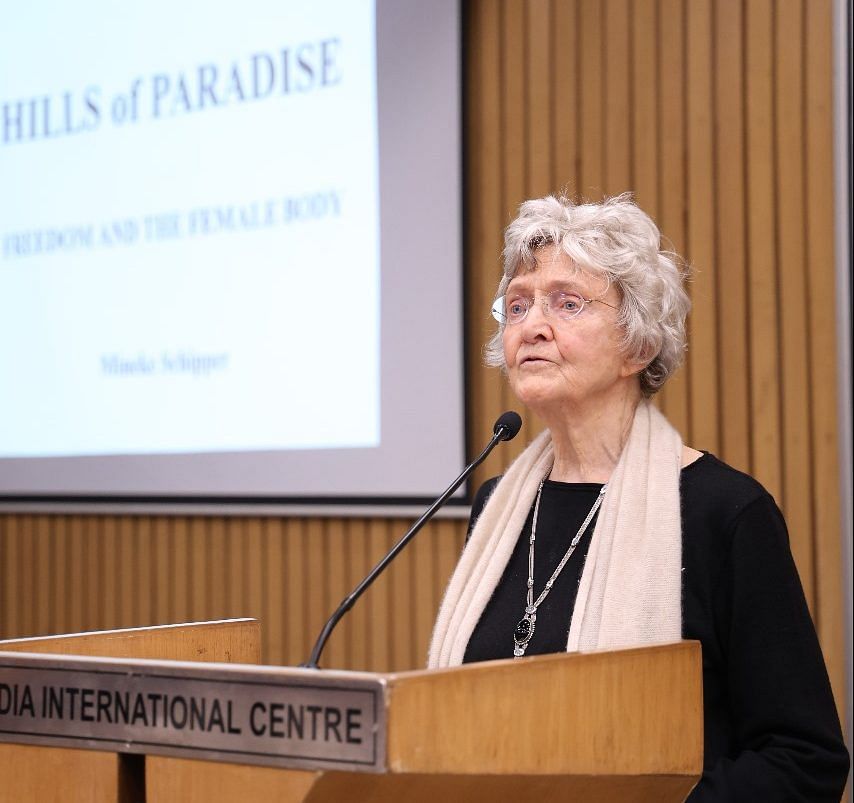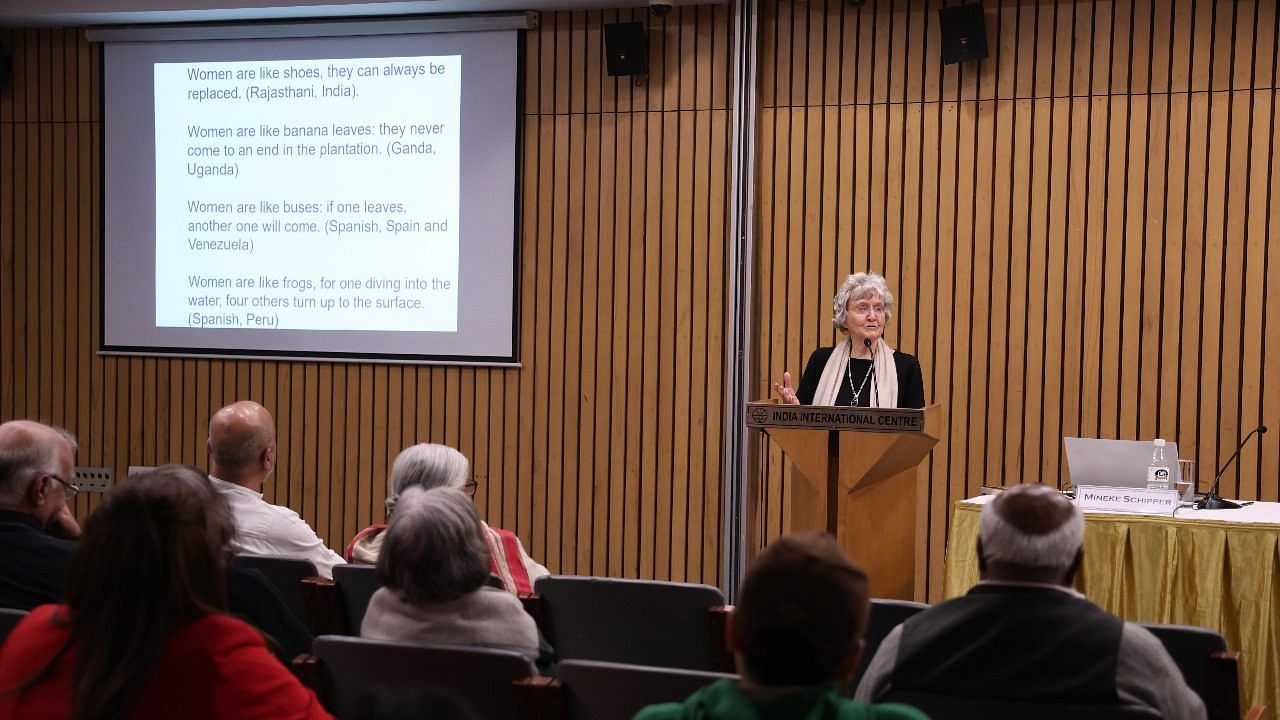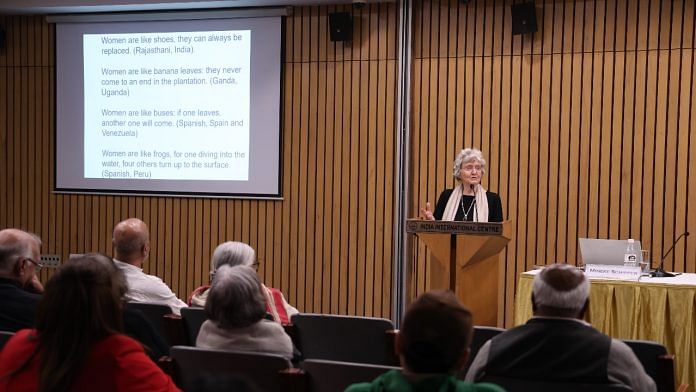New Delhi: Eminent Dutch author Mineke Schipper analysed 1,500 proverbs and 500 origin myths about women from 240 countries, and all of them revealed a striking similarity: the consistent portrayal of women as inferior, the ‘Other.’
Proverbs from around the world echoed a common theme of limiting women’s roles. Whether it’s the European notion that “real men explore the world, decent women stay at home” or the Malaysian belief that “a travelled woman is a garden trespassed by cattle,” the sayings reinforce the patriarchal idea that women should be confined to domestic spaces.
Some of Schipper’s findings, which are now part of her book Hills of Paradise: Power, Powerlessness and the Female Body, were presented at the first Cleveringa lecture. It was held for the first time in India and was organised by Leiden University, Letternfonds (Dutch Foundation for Literature), Embassy of Netherlands, IIC, and Speaking Tiger (Mineke’s publisher). It shed light on the persistent gender inequalities embedded in cultural proverbs and ancient myths.
In her groundbreaking analysis, Schipper draws attention to the ancient myths that established a hierarchy still prevalent today. These narratives often depicted women as creations of inferior quality, fashioned from a small part of the first man. This portrayal, coupled with male fear and awe, led to the control and restriction of women through practices such as veiling, purdah, and clitoridectomy.

Both the lecture and her book are lessons in resistance, rationality, and revolution.
The Cleveringa lecture’s history goes back to the 1940s when the Netherlands was occupied by Germany and Dr Cleveringa gave a speech against the banishment of Jews from the Leiden University. The lecture, part of the Cleveringa series rooted in resisting injustice, emphasises the need to challenge entrenched gender norms.
Schipper explores how male insecurity has fuelled a barrage of belittling commentary on women. Despite contradictions, the impact of this belittlement persists, influencing societal views on women’s fitness for leadership positions. The lecture underscored the enduring impact of historical gender narratives, affecting not only women’s professional standing but also their appearance and self-esteem.
“Public invisibility of the female body in patriarchal traditions and the sexy visibility of the female body as a lush object into this consumer society affect two sides of the same coin: the coin of appearance slavery,” she adds.
The author exposes the global prevalence of degrading comparisons through proverbs like “women are like shoes, they can always be replaced” from Rajasthan, India; or “women are like buses, if one leaves, another one will come” from Spain. These comparisons, deeply rooted in patriarchal traditions, contribute to the commodification and objectification of women.

Earth is too big to hold the sky in its arms
In her lecture, Schipper traces the historical shift in representations of femininity from early mother goddess narratives associated with life to their transformation into submissive partners of male gods. This transformation, she argues, played a pivotal role in establishing and maintaining gender hierarchies.
“Mother earth’s career had all the potential of stepping on to the echelon of the supreme goddess, but it was blocked by the glass ceiling of her sacred marriage with the male god of heaven,” Schipper says.
She then shares a Chinese origin story with a rapt audience, some of which included Sridhar Balan, Shabnam Hashmi, and Mridula Garg, among others.
The ancient tale of the earth being too vast for the sky to embrace. Faced with this dilemma, the sky, acknowledging his wife’s greatness, implores her to shrink. In her adaptability, the earth complies, giving rise to mountains, valleys, and all living creatures through their union. This narrative parallels the historical pattern where women, despite their life-giving role, have made themselves smaller than men, attributing the root of life’s misery to femininity. Over time, procreation shifted to fabrication, dominated by males, reversing traditional roles and emphasising the autonomy of the creator.
From Aristotle’s belief in the deficit of female powers to the Dutch inventor of the microscope claiming to see tiny human beings in his semen, Schipper highlights the persistence of unfounded beliefs about women’s capabilities.
Rewriting narratives
Despite acknowledging progress, where women now hold positions previously inaccessible to them, Schipper notes that increased visibility has not eradicated societal uneasiness, frustration, and violence towards women. When an audience member asks if she has more examples where femininity is celebrated instead, she adds that it is all over history but needs a keen eye to sift through the narratives, drawing loud claps from the audience. But why is this important?
Schipper argues that “humanity’s impressive house of storytelling” could do with some retrospection.
“We always think in categories of us and them and we still hold on to them. Instead of looking at similarities, we see the differences. In our passion for identity, we forget how much we share as human beings,” she tells ThePrint.
This is the note of hope she ends her lecture with.
“We cannot change history but awareness of the past enlightens our view of the present and prepares us to know where we want to go,” she says. One is reminded of her book’s last phrase: ‘We can but dream’.
(Edited by Prashant)



